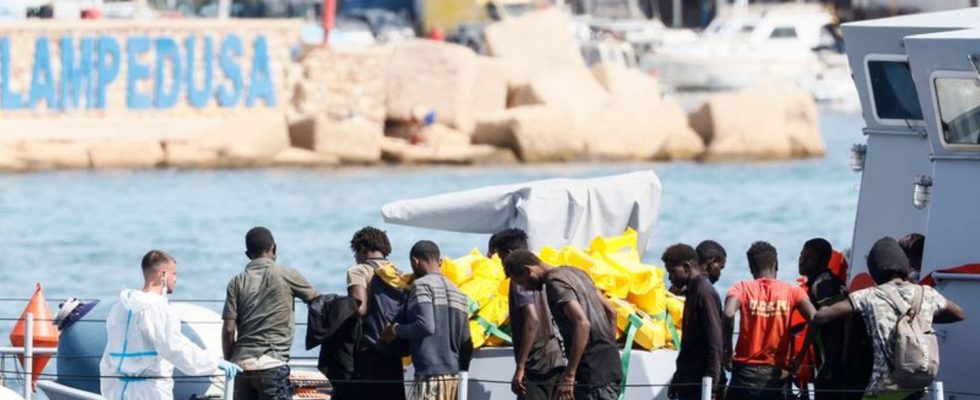migration
CDU calls for “joining forces” for falling refugee numbers
Rescued migrants stand on an Italian financial police boat before disembarking in the port of the Sicilian island of Lampedusa. photo
© Cecilia Fabiano/LaPresse/AP/dpa
Politicians are struggling to find the right answers to the migration situation. While the opposition is putting pressure on the government, there are signs of movement on the issue of additional border controls.
In view of the significantly increased number of refugees, CDU General Secretary Carsten Linnemann has a “There is a need now for “a consensus like in 1993,” Linnemann told the “Süddeutsche Zeitung.” At that time, the basic right to asylum was restricted on the basis of the so-called asylum compromise between the Union and the FDP and the then opposition SPD. Meanwhile, it became known that the Federal Ministry of the Interior is examining short-term stationary border controls at the borders with Poland and the Czech Republic.
“If we want to master this challenge, then the parties in the German Bundestag must be prepared to work together across party lines,” demanded Linnemann. “Personally, I would immediately stop any public escalation in the dispute with the traffic light parties – and I would immediately be ready to say: Come on, let’s sit down at the table! So that the number of refugees goes down.” The entire infrastructure is not designed for this high number of people, he warned.
“Germany Pact in Migration Policy”
On Friday, the opposition Union had already tried in the Bundestag to put pressure on the traffic light coalition with a proposal for a “Germany pact in migration policy”. Federal Interior Minister Nancy Faeser (SPD) defended the government against allegations: “Our measures are working. We control and regulate migration,” she emphasized.
Vice Chancellor and Economics Minister Robert Habeck spoke to the editorial network Germany of a “big challenge for the country”. At a conference with mayors and district administrators, he was told about overload and excessive demands: “They say that in many places they no longer know how to solve the problems.” There is “a certain drama,” said the Green politician. “If we don’t want right-wing populism to exploit this issue, then all democratic parties are obliged to help find solutions.”
According to the report, Habeck emphasized that his party was also prepared to find pragmatic solutions in order to reduce the influx at the EU’s external borders. “The government agreed to a Common European Asylum System, which, among other things, provides for asylum procedures at the EU’s external borders, but it was difficult for many Greens,” he said. In order to protect the right to asylum, “we have to accept reality and solve the concrete problems – even if it means making morally difficult decisions. We know that we have a responsibility for cohesion in this country.”
CDU party leader Friedrich Merz called for a tougher course on deportations: “The Danes are very consistent in this regard, there will then only be benefits in kind, those affected will only be placed in collective accommodation and will then be consistently deported,” said the Union faction leader at an event organized by the ” Augsburger Allgemeine” (Saturday), as the newspaper reported. By changing course on asylum policy, the Social Democratic government in Denmark was able to reduce the share of the vote of right-wing national parties from over 20 to less than 3 percent.
border controls
There were signs of possible movement in the controversial issue of border controls. Interior Minister Faeser told “Welt am Sonntag” when asked whether there would be short-term stationary border controls on the Polish and Czech borders: “In my view, this is an opportunity to combat smuggling crime more aggressively.” A spokesman for her ministry told the German Press Agency with reference to the interview: “Appropriate additional border police measures are currently being examined.”
Such additional controls must go hand in hand with the surveillance of the entire border area by the veil search, said Faeser. “To this end, we have already significantly increased the presence of the federal police on the Polish and Czech borders,” explained the SPD top candidate for the Hesse state elections on October 8th.
At the same time, she warned: “One should not suggest that no more asylum seekers will come as soon as there are stationary border controls.” If a person asks for asylum at the border, the asylum application must be examined in Germany. The protection of the EU’s external borders remains crucial, “which we achieve with the common asylum system”.
Faeser had recently rejected the Union’s demand for stationary border controls, for example on the borders with Poland and the Czech Republic, as “symbolic politics”.
In the Bundestag on Friday, Faeser referred to the reform of the European asylum system that has already been initiated, to intensified cooperation with Poland and the Czech Republic at the borders and to strengthening the federal police for the so-called covert search. “So we’re already taking action wherever you ask.”
There have recently been increasingly dramatic warnings of overload from states and municipalities. By the end of August, the Federal Office for Migration and Refugees registered more than 204,000 initial applications for asylum – an increase of 77 percent compared to the same period last year. In addition, as a result of the Russian war of aggression, more than a million Ukrainians sought protection in Germany without having to apply for asylum.

